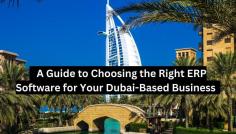
1. Identify Your Needs: Start by outlining your business processes, goals, and challenges. Determine which functions are critical, such as finance, HR, inventory, or customer relationship management.
2. Scalability and Flexibility: Choose ERP software that can grow with your business. Ensure it supports future expansion and can easily integrate with other systems or modules as your needs evolve.
3. Localization and Compliance: In Dubai, compliance with local regulations is essential. Opt for ERP solutions that offer localization features, such as Arabic language support and adherence to UAE tax laws.
4. User-Friendliness: An intuitive interface and easy navigation are key. Look for software with a user-friendly design that minimizes training time and boosts user adoption
5. Vendor Support and Reputation: Research vendors with a solid track record in Dubai. Check customer reviews, case studies, and support services to ensure you get reliable assistance and updates.
6. Cost Consideration: While cost is important, prioritize value. Consider total cost of ownership, including implementation, training, and ongoing support, to ensure you’re making a wise investment.
7. Customization and Integration: Ensure the ERP software can be customized to fit your unique business processes. Check its compatibility with existing software and third-party applications to maintain seamless operations.
Choosing the right ERP software Dubai can significantly enhance your business efficiency and growth. Take the time to evaluate your options carefully to find a solution that aligns perfectly with your strategic objectives

